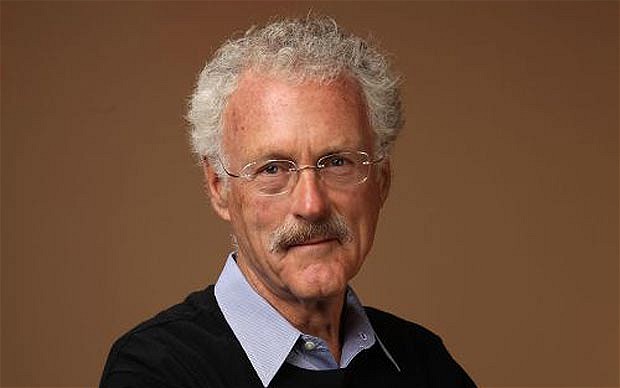Re The UN General Assembly Speaker Schedule is Here! I note that whoever will be speaking for Canada this year…
Jake Eberts R.I.P.
Written by Diana Thebaud Nicholson // September 11, 2012 // Absent Friends // 1 Comment

Photo: Getty
Jake Eberts
(The Telegraph) Jake Eberts, who has died aged 71, was a Canadian investment banker credited with single-handedly reviving the fortunes of the British film industry by producing such Oscar-winning triumphs as Chariots of Fire (1981) and Gandhi (1982).
When Goldcrest then came up with Gandhi, Eberts’s reputation was sealed. It was easily his most ambitious project – a $24 million epic about the Indian national hero who led his nation to Independence, which the director Richard Attenborough believed he had been born to make. When Eberts read the two-hour long screenplay — twice — at a single sitting, he was so moved he wept.
In the autumn of 1980 he called on more than 100 potential investors in Switzerland, France, New York and the City of London, and talked to banks, pension funds, insurance companies and investment houses. “But we got not the slightest show of interest from anyone,” he remembered. “There wasn’t even one close call.”
Having already spent more than the $700,000 Goldcrest had pledged in pre-production funding, Eberts feared the project might bankrupt his company. Only after repeatedly shuttling by jet between London, Mumbai and New York, and cajoling the Indian government in the course of some 100 meetings, did he eventually save the day.
The film won eight Oscars, and launched the film career of Sir Ben Kingsley. Goldcrest went on to enjoy further critical and commercial success with films such as Puttnam’s Local Hero (1983) and The Killing Fields (1984), and the Merchant-Ivory Edwardian romance A Room with a View (1985). In all, Eberts financed or produced more than 50 films, which between them earned 37 Oscars, including four for Best Picture.
The son of an executive with Alcan Aluminium, John David Eberts was born on July 10 1941 in Montreal, the third child in a middle-class, English-speaking family in the largely French-speaking province of Quebec. After studying Chemical Engineering at McGill University, Montreal, he joined a French company, L’Air Liquide, and worked on the design of new gas liquefaction plants in France. Frustrated by his limited earnings potential, he retrained at Harvard Business School.
Graduating in 1966, he worked as a financial analyst for an American firm making diesel engines, and later as head of its European marketing operation. In 1968 he fulfilled an ambition to work on Wall Street, spending three years in New York before moving to London to work for the investment bank Oppenheimer, eventually becoming managing director of its London office. But none of these posts brought him the rewards he craved.
In 1974 Oppenheimer agreed that Eberts could try to raise $50,000 in development money for an animated film version of Richard Adams’s bestselling novel Watership Down. The project changed his life. “I was captivated by the film business,” he recalled. “It was a world in which I, with my banking skills, had something special to offer.”
With its anthropomorphic cast of rabbits and epic themes of survival in the face of destruction, Watership Down (1978) took more than three years to make, and was a worldwide success.
By the time it was released, Eberts had launched Goldcrest and been persuaded by Puttnam of the importance to the future of film making of a reliable source of independent financing. Under Eberts’s guidance, Goldcrest attracted significant investment for films from financial institutions in the City of London for the first time since the heyday of Alexander Korda in the mid-1930s.
Puttnam, back from an unhappy sojourn in Hollywood, then pitched the idea for Chariots of Fire. It was, as Eberts recalled, “the film that would change all our lives and set Goldcrest on its extraordinary trail of Oscar success”.
On the face of it, the project was problematic on two counts: the class-ridden tale of two rival university athletes in 1920s Cambridge was not only intrinsically British (a Hollywood negative) but also a period piece (a film genre with a history of disasters). Eberts had a “terrible time explaining what Chariots was about” to potential backers before Puttnam exercised his well-practised powers of persuasion.
In 1983, with Goldcrest at its peak, Eberts stood down to become head of America’s independent Embassy Pictures. He briefly returned, but by 1987 Goldcrest had collapsed in a welter of financial woes, runaway budgets and a series of film flops — notably Revolution (1985), which The New York Times described as “so giddily misguided that it’s sometimes a good deal of fun for all of the wrong reasons… It’s not easy to goof on this scale.”
Goldcrest was taken over , and Eberts established another independent company, Allied Filmmakers . It helped to produce an impressive roster of high-quality films, including The Name of the Rose (1986), Hope and Glory (1987), Baron Munchhausen (1988) and Driving Miss Daisy (1989), which between them received 18 Oscar nominations.
He was later chairman of National Geographic Films, which made the Oscar-winning March of the Penguins (2005), and was working again recently with the Chariots of Fire director Hugh Hudson on a nature epic to be shot in Canada.
Latterly Eberts, sensing a change in filmgoers’ attitudes, had turned his attention to documentaries; his final project, Jerusalem, an Imax 3-D production due for release next year, chronicles a day in the life of three teenagers, a Jew, a Muslim and a Christian, in the Holy City. He had also been developing The Last Empress, a $60 million joint Sino-American venture about the ruthless Dowager Empress Cixi, who effectively controlled the Qing dynasty in the late 19th century.
Tall, softly-spoken and bespectacled, with a self-effacing air, Eberts did not resemble the brash film mogul of popular imagination. Nor did he embrace the fashion for macho screen heroics, rejecting projects defined by sex and violence. Of his success during Goldcrest’s golden age, he was characteristically modest. “There was a niche in the market,” he noted, “and I happened to be in the right place at the right time.” He charted his career in My Indecision is Final (1990), written with the British journalist Terry Ilott.
Eberts was appointed a Member of the Order of Canada in 1992.
Jake Eberts is survived by his British wife, Fiona, and their two sons and a daughter.
7 September
EBERTS, John David (Jake), O.C.
Jake left this earth peacefully on September 6, 2012 in the arms of Fiona, his soul mate of 44 years, and his adored and adoring children, Alexander, David (Maria Toumanova) and daughter Lindsay. He was the third son of the late Ted and Toppy (MacDougall) Eberts. Jake was the centre of an extended family which includes his five siblings, Edmond (Maureen Mannix), Gordon, Lindsay (Patti Paxton), Beth (Tony Stikeman) and Jeremy; fifteen nephews and nieces and sixteen great-nephews and great-nieces who drew constant inspiration from him.
Jake’s life was as full and varied and vibrant as he could make it. He channeled great energy, intelligence and passion into every waking moment which enabled him to accomplish virtually anything to which he set his mind. He was driven, restless and possessed insatiable curiosity and a voluminous memory about the widest range of subjects. Born in Montreal in 1941, Jake was educated at Arvida High School and Bishops College School. He graduated from McGill University in Chemical Engineering and completed an MBA from Harvard University four years later. After three years on Wall Street, Jake joined Oppenheimer & Co. in London in 1971 where he later became Managing Director. In 1977, he founded Goldcrest Films which became one of the most successful independent producers of motion pictures.
In 1985, he started Allied Filmmakers, an independent feature film development and production company based in London and Paris. Over 35 years, Jake was the executive producer or producer of many internationally acclaimed feature films of the highest order and box office success. His films earned 65 Oscar nominations and 37 Oscars including four Best Picture awards, namely Chariots of Fire, Gandhi, Driving Miss Daisy and Dances With Wolves. His book, My Indecision is Final, is widely read in film schools.
Jake was deeply involved in many business and philanthropic endeavours which he led with his customary integrity and principles. His natural creativity, tireless globe-trotting and ever ready cellphones were in constant demand. He earned numerous honours in Canada, the U.S. and abroad including Officer of the Order of Canada, honorary doctorates from McGill, Bishops and Trent Universities, and the Dwight D. Eisenhower Citizenship Award. He received these honours with his trademark modesty and self- deprecating wit. Jake was comfortable with people from all walks of life and generous in kind and spirit to so many.
He loved the outdoors where he was most at home in the forests and on the rivers of his native Quebec. The natural beauty and serenity provided an environment to imagine the possible and set his sights on something new and worthwhile.
Jake’s family was the centre of his life. They will dearly miss his indomitable presence and loving leadership at the vortex of so many activities. His family will forever remember and be inspired by his love, his modesty, his sharp wit, and his boundless enthusiasm for life that left them exhausted and exhilarated.
A private family funeral will be followed by a memorial service in the near future. In lieu of flowers, his family has asked that donations be directed to the Nature Conservancy of Canada, 1000 – 55 Mont-Royal Avenue West, Montreal QC H2T 2S6 (www.natureconservancy.ca). Or to McGill University, c/o Valerie Maurer, 1430 Peel Street, Montreal, QC H3A 3T3 (https:/ /www.alumni.mcgill.ca/give); these funds will be directed to McGill’s First Peoples’ House which is supported by the Eberts Family Fund.


One Comment on "Jake Eberts R.I.P."
I was waching the Academy Award when they show the picture of Jake Eberts talking about his deft. I was surprise and sad, Jake toll me Guy you are always be welcome here when I was working for the family at St-Catherine de Hatley. Jake was a friend and I did not have the chance to see him before he live. I live too fare in north of the province, Ouje-Bougoumou a Cree indien reserve, and I dont go to Sherbrooke to often. I will like to wish to the family my sincere condeleance.